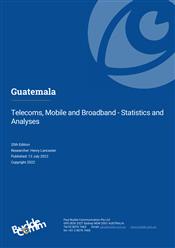Guatemala Telecoms Market Report
Telecoms, Mobile and Broadband - Statistics and Analyses

MIC takes full control over Tigo Guatemala
Guatemala’s telecom infrastructure is relatively poor for the region, the result of underinvestment. However, there has been some stimulus recently from the US, which has earmarked up to $1.9 billion for local projects aimed at improving telecom connectivity and services across Central America. It is hoped that these upgrades would dissuade migration to the US by enabling locals to take advantage of ICT services locally.
In addition, the government and telecom regulator have stepped up their investment efforts, which has resulted in a steady growth in the number of fixed lines. In turn, this has stimulated the take-up of fixed broadband. The local telco Tigo Guatemala in late 2021 became wholly-owned by Millicom, and the unit now accounts for the largest proportion of MIC’s revenue.
Two new submarine cables are due for completion later in 2022. Improved international connectivity should drive further uptake of both fixed and mobile broadband services.
Key players including Tigo Guatemala and América Móvil are regional powerhouses which can tap into expertise and financial resources to bolster their Guatemalan businesses. The acquisition of Telefónica’s Guatemala business by América Móvil in 2019 created a strong competitor to Millicom, which dominates the mobile sector. Intense competition among the operators has helped to improve services and lower prices for end-users.
Key developments:
- Viasat set do deliver satellite broadband services across Guatemala;
- COMNET secures additional capacity to provide satellite broadband services;
- Regulator approves the reorder of some spectrum in the 700MHz band, aims to auction 60MHz in the band;
- América Móvil spins off its tower operation;
- South Pacific Cable is made ready for service;
- Guatemala to connect to the Aurora cable system later in 2022;
- Report update includes the regulator’s market data to December 2021, operators’ data to Q1 2022, updated Telecom Maturity Index charts and analyses, recent market developments.
Companies mentioned in this report:
América Móvil (Movistar, Claro, Telgua), Tigo (Millicom), Telefónica, Guatel, Cablenet, Unitel, Comcel, A-Tel, Columbus Business Solutions, Ufinet, Convergence Communications.
Related Reports
- Latin America - Fixed Broadband Market - Statistics and Analyses
- Latin America - Mobile Network Operators and MVNOs
- Caribbean - Telecoms, Mobile and Broadband - Statistics and Analyses
- Ecuador - Telecoms, Mobile and Broadband - Statistics and Analyses
- Haiti - Telecoms, Mobile and Broadband - Statistics and Analyses
- Argentina - Telecoms, Mobile and Broadband - Statistics and Analyses
- Costa Rica - Telecoms, Mobile and Broadband - Statistics and Analyses
- Uruguay - Telecoms, Mobile and Broadband - Statistics and Analyses
- Peru - Telecoms, Mobile and Broadband - Statistics and Analyses
- Brazil - Telecoms, Mobile and Broadband - Statistics and Analyses
Share this Report
TMT Intelligence
A platform to scale your intelligence tasks
Monitor critical insights with our AI-powered Market Intelligence Platform gathering and analyzing intelligence in real time. With AI trained to spot emerging trends and detect new strategic opportunities, our clients use TMT Intelligence to accelerate their growth.
If you want to know more about it, please see:
Research Methodology
BuddeComm's strategic business reports contain a combination of both primary and secondary research statistics, analyses written by our senior analysts supported by a network of experts, industry contacts and researchers from around the world as well as our own scenario forecasts.
For more details, please see:
More than 4,000 customers from 140 countries utilise BuddeComm Research
Are you interested in BuddeComm's Custom Research Service?
Hot Topics
News & Views
Have the latest telecommunications industry news delivered to your inbox by subscribing to BuddeComm's weekly newsletter.